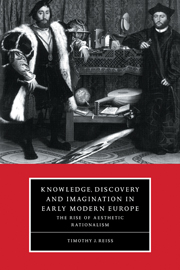Book contents
- Frontmatter
- Contents
- Prologue and acknowledgements
- A note on the text
- Introduction
- Part 1 Problematizing the language arts
- Part 2 Passages
- Part 3 Mathematics, music and rational aesthetics
- 5 Quadrivial pursuits
- 6 Bridging effects
- 7 Musical elaborations
- 8 Well-tempered imagining
- Bibliography
- Index
- CAMBRIDGE STUDIES IN RENAISSANCE LITERATURE AND CULTURE
8 - Well-tempered imagining
Published online by Cambridge University Press: 01 February 2010
- Frontmatter
- Contents
- Prologue and acknowledgements
- A note on the text
- Introduction
- Part 1 Problematizing the language arts
- Part 2 Passages
- Part 3 Mathematics, music and rational aesthetics
- 5 Quadrivial pursuits
- 6 Bridging effects
- 7 Musical elaborations
- 8 Well-tempered imagining
- Bibliography
- Index
- CAMBRIDGE STUDIES IN RENAISSANCE LITERATURE AND CULTURE
Summary
In the 1610s the French architect, engineer, musician and scholar Salomon de Caus was organizing the marvels of Heidelberg Castle for Frederick and Elizabeth Palatine, future parents of that Princess Elisabeth who a generation later was to be so important for Descartes' thinking. By 1621 Caus had to leave the Palatinate, subject now to destruction by the very army of which Descartes had been a part in 1619/20. Caus eventually ended up at the court of France. Descartes was to spend many years near and as a frequenter of the Palatine court in exile at The Hague. These overlaps are especially intriguing because of another. In 1615, just three years before Descartes wrote the Compendium, Caus issued his Institution harmonique.
This work simply took for granted the various elements we have explored : ‘Music is a science by which low and high sounds, proportional to one another and divided by just intervals, are so disposed that sense and reason are satisfied’. This definition was preceded by a brief history, as in Zarlino, and followed by an exploration of the intervals and proportions in question, as well as their composition. To define music thus as a theoretical science dealing with the organization of sounds so as to satisfy ‘sense and reason’ obviously owed everything to Zarlino and the tradition culminating in his work.
- Type
- Chapter
- Information
- Knowledge, Discovery and Imagination in Early Modern EuropeThe Rise of Aesthetic Rationalism, pp. 188 - 200Publisher: Cambridge University PressPrint publication year: 1997



